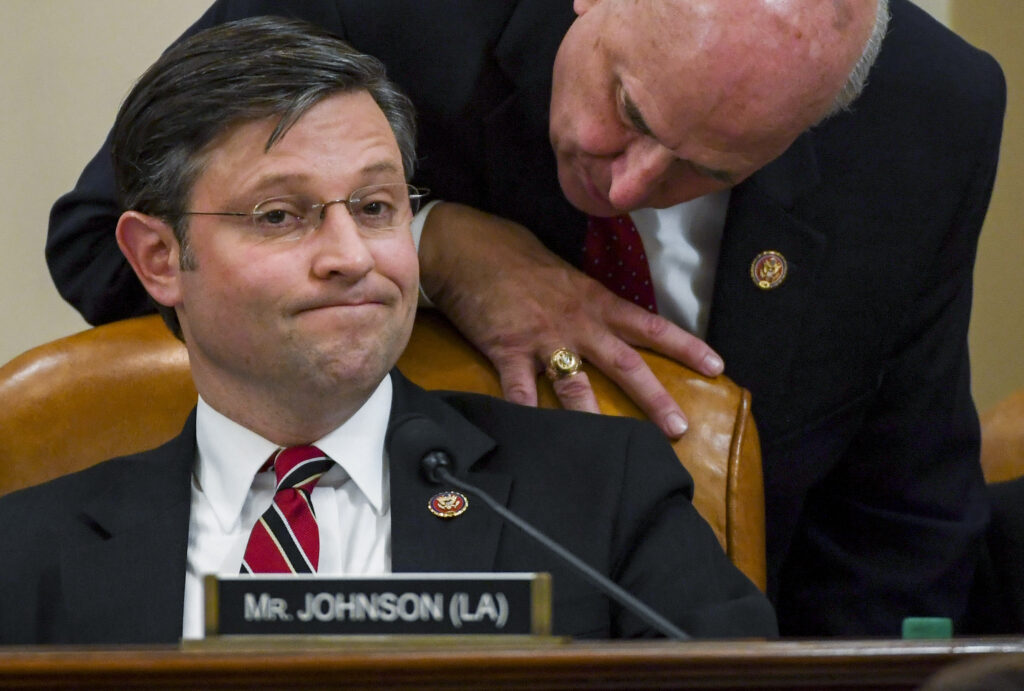SAVE Act: House Passes GOP Voting Bill That Could Disenfranchise Millions

The U.S. House of Representatives voted Thursday to pass the Safeguard American Voter Eligibility (SAVE) Act, a major voter suppression measure that, if it became law, could disenfranchise millions of eligible voters and badly undermine U.S. democracy.
The vote count was 220 to 208, with four Democrats voting for the bill and zero Republicans opposing it. Democrats who voted for the bill were Reps. Jared Golden (Maine), Marie Gluesenkamp Perez (Wash.), Henry Cuellar (Texas) and Ed Case (Hawaii).
The SAVE Act would make it more difficult for active voters — Republicans and Democrats alike — to continue participating in elections, and would erect unprecedented barriers for new voters hoping to register and participate.
The bill appears to face long odds in the Senate, where it would need 60 votes to overcome an expected Democratic filibuster.
“In a bold new departure for the forces of voter suppression, MAGA’s so-called ‘SAVE’ Act will make it harder for tens of millions of eligible Americans to vote, including tens of millions of people, mostly women, who change their names after marriage,” Rep. Jamie Raskin (D-Md.) told Democracy Docket in a statement. “Every eligible voter should be able to access the ballot box, free from legislated intimidation, trickery and harassment.”
Republicans have pursued the SAVE Act under the guise of preventing noncitizens from voting, which they portray as an existential threat to the American electoral system. In fact, illegal voting by noncitizens — and fraud in general — is extremely rare.
“This isn’t about protecting voters or our elections, it’s about politicians who want to protect themselves and pick and choose their voters. But that’s not how democracy works,” Molly McGrath, the director of the ACLU’s national voting rights campaigns, said in statement calling on the Senate to reject the act.
“I am leading the fight in the Senate to push back against this effort to disrupt our already safe and secure elections. This bill cannot pass the Senate — and I will fight every step of the way to block it,” Sen. Alex Padilla (D-Calif.) said in a statement.
Among its changes, the bill would require everyone registering to vote or updating their registration information to present documentary proof of citizenship in person. Recent studies have shown that millions of eligible voters lack easy access to documents that prove their citizenship, like a passport, birth certificate or naturalization papers.
As many as 21.3 million U.S. citizens — more than 9% of voters — do not have such documents readily available, and over 3.8 million people — around 2% of voters — don’t have any form of proof, according to recent survey results gathered by the Brennan Center for Justice and other organizations.
The law would disproportionately affect voters of color. Millions of people who have taken their spouse’s last name — which includes approximately 69 million married women — and people who have changed their names may also face difficulty when registering or updating registration info because the law doesn’t specify what documents would be accepted to prove their identity.
Rural voters or people with disabilities would be affected as well, because the measure requires documents to be presented in person, which also undermines mail and online registration systems and voter registration drives.
“My Republican colleagues crafted and passed one of the most damaging voter suppression bills in modern history,” Rep. Joe Morelle (D-N.Y.) said in a statement. “There’s no doubt that women, military members, and people of color will be disproportionately impacted. The fight to stop this bill – to protect Americans’ sacred right to vote – is not over.”
In addition to its citizenship requirement, the SAVE Act threatens election workers with up to five years in prison or civil lawsuits if they register someone without the correct documents, even if that person is a citizen.
And the bill aims to restrict mail voting by barring states from counting mail ballots that arrive after Election Day, as many states currently do.
“The SAVE Act would undermine Americans’ ability to participate in free and fair elections, and disenfranchise millions of eligible voters,” Colorado Secretary of State Jena Griswold said in a statement. “This is a threat to our democracy that cannot be ignored.”
Last year, the House passed a similar bill but it stalled in the Senate and then-President Joe Biden vowed to veto it. This time around, President Donald Trump has endorsed the bill and Republicans have majorities in both chambers, though the bill still faces long odds in the Senate.
The SAVE Act was also introduced in the Senate in January but so far has gone nowhere. To pass the Senate, the bill would need a 60-vote supermajority to overcome a filibuster. That would require seven Democrats or independents to join Republicans, which is unlikely.